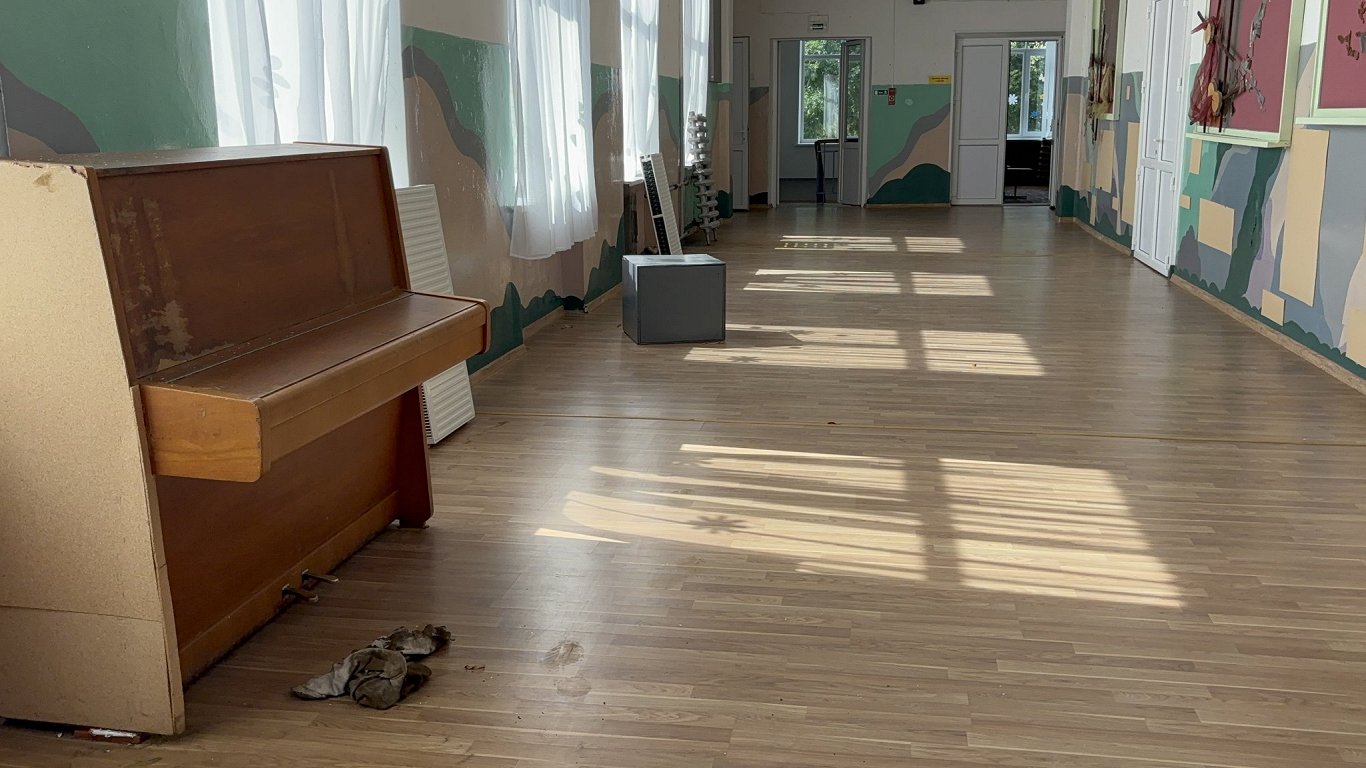In Latvia, over the last ten years, several schools have been renovated for 1.45 million euros from taxpayers' money, which were closed soon after. The responsible officials who decided to renovate these schools deny any misuse of taxpayers' money. But how can such decisions be made?
In the Alūksne district, over the last ten years, 11 schools have been closed down or 'liquidated'. However, in most of them, several hundreds of thousands of euros were invested in school repairs before closing.
In four of the closed schools, which are now standing empty, the municipality of Alūksne invested more than 800,000 euros before liquidation.
One of these is located in Alsviķu parish and it is the former Strautiņi elementary school. Its building is one of the central buildings in the village of Strautiņi and is located right on the side of the road. There is also a basketball court and a gazebo nearby, and on the other side of the school there is a small valley, a pond and a meadow surrounded by a forest.
Alsviķu parish, with a little over 1,000 inhabitants, is a short drive from Alūksne, the main town of the district.
The doors of the rural school are closed. At the main entrance, the sign indicating that there is a school here has been removed. Looking through the windows of the first floor, you can see that the rooms are empty.
Latvijas Radio met Sigita Mūrniece, a mother of three children, at the former Strautiņi elementary school. The eldest of her children studied at Strautiņi elementary school for one year, and then the village school was closed.
In February 2023, the local government of Alūksne district liquidated Strautiņi elementary school, where fewer than 100 students studied in the last year. Mūrniece remembered that there were talks in the village about the closure of Strautiņi elementary school several years ago.
"Already in 2018, there was some kind of scandal between the municipality and the parents, because even then the management wanted to close the school. There were various justifications, that more investments were needed and that the school was very close to Alūksne. Then it all died down but took off again in 2022," said Mūrniece.
In 2020 the municipal deputies decided to invest 50,000 euros in school repairs, but after three years, the school was closed. "The rainwater drainage system was replaced for 11,000 [euros]. There was a plan for the roof beams, doorways and basement support. Then the windows were replaced," said Mūrniece.
Alūksne district municipality stated that in the last ten years before the school's liquidation, the municipality invested more than 75,000 euros in its repair. In addition to sewer and window repairs, the roof of the school was also replaced.
The municipality made the most ambitious investments - almost 50,000 euros - three years before the school closed, when they strengthened the building structures and improved the learning environment.
"When the talk about closing schools started and when it's relevant for me right now, because I have three children, then I started digging into it all, researching, looking at their numbers and it doesn't seem to make economic sense," said Mūrniece.
The woman does not agree with the municipality's argument that there is a lack of children in Strautini and there is no need for a school here.
"In Strautini, in my opinion, the demographic situation is not decreasing. Taking into account that my youngest daughter studies in kindergarten, the groups there are always full. Also because there is no place in Alūksne, but also because families moved here. And you can feel it in the countryside. Here everything is always humming and buzzing. That's why it was sad to close Strautiņi. There is always life here," said Mūrniece.
She is skeptical about the plan of the deputies to sell the liquidated school buildings, which have now been empty for several years.
"Will someone really buy them and use them properly and effectively? I don't believe it. (..) I would like someone local to be able to buy them, who goes in there and works, because there is a fantastic gym," said Mūrniece.
Not a worthwhile investment
In Alūksne region, ambitious energy efficiency improvement projects were carried out in three more schools a few years before their closure.
In total, almost 800,000 euros were invested – about half of this amount is municipal funds and a loan from the State Treasury, while the other half was covered by the Climate Change Financial Instrument. It is a state budget program supervised by the Ministry of Climate and Energy.
Large-scale renovation took place in Mālupe elementary school, Jaunanna Music and Art elementary school and Ilzene elementary school. There is currently a hostel in Mālupe primary school, but the buildings of Jaunanna and Ilzene primary schools are empty.
The director of the liquidated Ilzene elementary school, Inese Žigure, who also worked as a teacher at the school before that, stated that the closing of the school was not a surprise to her, because the parish has few inhabitants. Žigure said: "I don't know a very specific number, but about 250 [inhabitants in the parish]. (..) In recent years, there were very few students. In 2018, we had 25 students. So it was not a surprise in any way."
She remembered that a hundred children once studied at the Ilzene elementary school: "But it's a process. There are no jobs in the countryside, young people don't return, children aren't born. It's a vicious circle."
Although the number of pupils in the Ilzene primary school kept decreasing, the Alūksne district municipal council members decided to invest 200,000 euros in improving the building's energy efficiency. And three years after that, the school was closed.
The Ilzene elementary school building is empty, but the surrounding area is maintained. There is a football field next to the school.
The school principal said that she did not participate in the council meetings where it was decided to close the school. When asked if the decision of the regional municipality to invest in the school, knowing that it would soon have to be closed, was reasonable, Žigure answered: "I will not say anything original, in my opinion, it is not a meaningful investment, because I think that in 2015 it was known that the school would close. If I'm not mistaken, the contract stipulated that the school must exist for another five years after the implementation of this project, that is, the school must be in this building for five years."
Ilzene elementary school was closed three years after the start of the energy efficiency project. Žigure said that the closing of Ilzene elementary school affected the life of the village.
"The school is the heart of the parish, in reality, and if there is no school, then the whole social and cultural life gradually shrinks. And the parish, it sounds rather harsh, but it dies out. Because we have such a quiet, peaceful life here. Yes, then there were children, then there was activity. You can't compare it with what it is like now," said Žigure.
It's not just in Alūksne district that such examples can be found. In the last ten years, 8 now closed schools have been renovated at a cost of 1.45 million in Alūksne, Rēzekne, Saldus and Limbaži districts.
Decision-makers
The chairman of the Rēzekne District Council, Monvīds Švars ("For Latvia's Development") has been holding the mayor's chair for 15 years. This means that he has decided both on investments in schools and on the liquidation of educational institutions.
"Since 2008, the district has developed a plan for the optimization of educational institutions. The direction was outlined that under no circumstances should we make investments in objects in which we do not see a perspective for the long-term use of the given object. In this case, it is decided whether there will be a sufficient number of children in the given place to complete classes and for the educational institution to continue working," Švars said.
He admited that while a decision to renovate Jaunstružani primary school before its closure looked like a wasteful one, it might in fact prove to be worthwhile in the long run and in any case it was parents' decisions to send their children to a neighboring school that forced the council to economize.
"This preservation is, of course, psychologically unpleasant for the local community, because the windows are dark, the life disappears in the building, but it is more important to preserve this building at such a level that the quality of the infrastructure does not deteriorate. In no way do we see this as mismanagement.
"Of course, there is one theory at the moment , which the local community is trying to prove on an emotional level. Parents who claim that, yes, their children will go to this school, then, of course, they also look for various excuses, why they didn't do it, why they chose the school next door," said Schwartz.
While walking around the Jaunstružani primary school, you can notice that the radiators have been removed in all rooms. This suggests that the municipality does not try to conserve the school infrastructure quite as much as Švars claimed.
Chairman of Alūksne County Council Dzintars Adlers ("New Unity") stated that approximately seven years passed between the decisions to start investment projects and to close specific schools.
The minutes of the decisions of the municipal council of Alūksne region show otherwise. Namely, only one year after the start of the energy efficiency project, the municipal deputies decided to liquidate both Ilzene and Mālupe primary schools. However, the regulations of the energy efficiency project overseen by the Ministry of Climate and Energy provide that five years after the repair, the municipality must ensure that classes are held in the school.
The Ministry of Climate and Energy, which oversees the Climate Change Financial Instrument co-financing state budget program, stated that the municipality of Alūksne region, without waiting for the end of the five-year monitoring period, asked to amend the contract for Ilzene elementary school.
The ministry explained that the beneficiary has the right to propose amendments and clarify the project. The municipality of Alūksne region used this opportunity. Consequently, it did not have to repay the funding received for the implemented project.
Asked why the municipality decided to invest in schools and close them soon after, Adlers answered: "I have had the honor of being here since 2009 as a deputy. And already in 2011, 2012, I saw and studied demographic situations and trends, how our territory will develop, what will be the population not only in the county, but in each parish. And it was clear that sooner or later the number of students in these parish areas will fall. Only it could not be said whether it would take five or seven years."
Adlers did not deny that he knew that the number of students at the Ilzene elementary school was declining, but he was also present in the decision-making process regarding investments in this school.
"I'll be honest, many don't want to hear it, because their own residents are against it. And no one wants to make this unpopular decision to prematurely close an educational institution. I'll be honest, I don't want to either. I'm sorry, if you don't decide on these investments, then it is proof that sooner or later that school will cease to exist. Of course, I saw it and warned my colleagues whether it was worth it," Adler said.
Doesn't the fact that he and the other MPs didn't take all these factors into account indicate a waste of money? Adler expressed, "I will say it's not a waste. But, yes, I think we need to rethink the investments we make going forward. It's certainly not a smart business move. But, yes, it's politics! Politicians don't really want to make unpopular decisions."
























